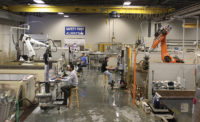A key word associated with the Internet is “convenience.” Everything that a smartphone or any other electronic device connected to the Internet does is to make life easier and, most of the time, faster. As we all know, time is the most valuable item we have, and anything that consumes less of it, tends to grow. The Internet is deeply involved into our lives, and as hard as we may try to avoid it, it seems the more we depend on it. If you stop and analyze the most successful companies around the world, they use Whatsapp, Spotify, Waze, Dominos and Google to obtain their victories. “Convenience” is the key word for the future, and whoever invests in it will not regret it, regardless the business model the company fits in.
The stone business is certainly not different. Starting with this magazine and its online version, which can be read anywhere without the need of carrying any hard copy to a homeowner choosing his fabricator or even preselecting the granite color he desires for his kitchen countertop. Most of the well-known exporters and distributors worldwide already have some sort of “online inventory” option or software in which their customers gain access to their inventory. Fabricators are now able to show their templates and estimates online. Most of the tools, machines and products alike specially designed for the stone industry can now be researched — and sometimes even bought — online. Customers from different segments of the stone industry are now using their devices to select products and communicate with their suppliers. There are some more developed systems in the market that offer a faster communication between buyers and vendors through online chats, shopping cart, order follow-ups and even online payments.
The Internet has also extended the normal “hours of operation” of companies by exposing their inventory online, which automatically keeps the business running 24/7. Think of this: a customer has to drive for many miles (usually with traffic in major cities) and with an appointment prior scheduled within the normal hour of operation with his sales representative, so he is be able to see the inventory and select his granite slab(s). On top of that, customers with overseas suppliers have to spend many hours, money (and sometimes even their health traveling long distances) to hand select their slabs. This has started to change with the newest online inventory systems available in the market. A total of 90% of Brothers In Granite’s actual sales to the U.S. is now made through one of these online inventory systems. That represents alone over $3.5 million per year in revenue coming from one of these online systems. The other 10% is done by what we now call “the old-fashion way” of e-mails and actual visits. A few other Brazilian suppliers adept to online inventory systems are experiencing the same feeling with their systems. According to PBA Stones and Zumax, their sales staff have recently improved the way they sell granite overseas.
“The use of our online inventory system has increased significantly the capacity of my sales representatives to approach customers,” said Ricardo Gomes, owner of Zumax - Brazil. “Now they are able to attend to at least 30% more customers than before, since their sales routine has now been summarized by this system. From checking our inventory to sending an offer by email and even a Pro Forma Invoice can now be done at one place and online from wherever they are. My U.S. sales staff now has the capability of checking our inventory online, as well as any other data they need such as customer database using their iPad, phone, etc. This has certainly changed our entire sales strategy in a very good way.”
In the past, stone trading was done through fax. We can’t even imagine how this is possible, right? Nowadays, e-mail seems to be the common way to communicate, but this is also starting to change with the freedom provided by online inventory systems. The same thing which Amazon and eBay has done to commerce all over the world is happening to the stone business by some of the online inventory systems. What do you think is more convenient? To receive a heavy e-mail with a limited number of colors for you to choose from, or have the opportunity to open an entire inventory from a supplier and use its intelligent filter technology to find whatever you desire whenever you want, wherever you are? Again, what is more efficient, faster and easier? In summary, it’s the word “convenience” taking place. Furthermore some of these systems provide the option for customers to use software and applications in which the purchasing experience is even smoother and quicker, with an offline mode that synchronizes whenever the device gets online again.
Not too long ago, I remember seeing sales representatives from many countries who traveled to the U.S. to visit customers with huge sample suitcases — sometimes made of wood and filled with stone pieces weighing over 11 pounds — having a hard time opening doors, flying, etc. Now brochures or even business cards seem to be losing their use for the online revolution. These online systems are gathering all these needs together in one place, and the best part is that they are stored on cloud servers. That means you can show your inventory with any device and access any data you need, such as a customer database, orders and their status, open invoices, files, etc. I’ve noticed that at some of the companies who use these technologies sales representatives are now traveling with nothing more than an iPad. No more samples, papers or even computers are needed to sell. On top of that a director of a company is now able to access all sales activities and all kinds of reports in his cell phone.
I always like to say that nothing will replace human relationships. After all, business is nothing more than someone buying or selling products/services to someone else. However, everything that makes this human connection more efficient, easier and quicker is accepted and tends to become a necessity. Nothing will ever replace the intelligence of a sales representative, for example, who knows what his customers like or how to approach him in order to close a sale. These software programs are out there, if used correctly with its many tools involved (Customer Relationship Management, E-mailing and other features alike) tends to be a very useful tool for them to sell more. As long as we are talking about people trading with people, nothing should replace the old shake of hands once a deal is closed. But imagine the world of possibilities these software programs can offer to an efficient sales representative who can handle it properly. Whoever knows how to handle the word “convenience” well will surpass others who don’t, and these professionals will never fear these types of technologies. A well-prepared sales staff knows how to approach customers at the right time and place. Stone shows and workshops should not be affected by these technologies, but instead they should take advantage of them and improve their chances of success.
So whenever you think of the future of your company, you should not avoid thinking of the Internet and its sales tools. The world has become majorly online, and the stone business is certainly not different. If you haven’t thought about that until now, I invite you to do so, since I’m sure your customers — and maybe your competitor — already did. The options are out there. Choose wisely, but choose.











